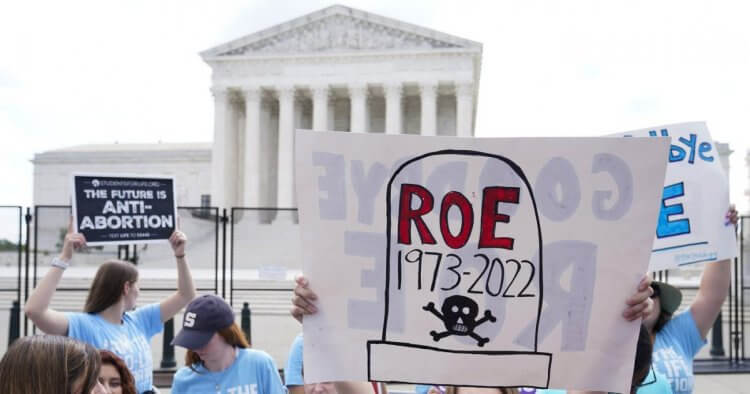The U.S. Supreme Court Friday in a 5-4 decision reversed its 1973 Roe v. Wade ruling that granted nationwide access to abortion.
Justice Samuel Alito delivered the 5-4 majority opinion published by the Court in the Mississippi case of Dobbs v. Jackson Women’s Health Organization. Alito was joined by Justices Clarence Thomas, Neil M. Gorsuch, Brett M. Kavanaugh and Amy Coney Barrett in ending federal abortion rights.
“The Constitution does not prohibit the citizens of each State from regulating or prohibiting abortion. Roe and Casey arrogated that authority,” opined Alito. “The Court overrules those decisions and returns that authority to the people and their elected representatives.”
Chief Justice John G. Roberts Jr. agreed but stopped short of joining the majority opinion in overturning Roe, saying he would have upheld only a Mississippi 15-week ban on abortion. That made the decision to uphold Mississippi’s law a 6-3 opinion. The decision to take the further step of overturning Roe v. Wade barely passed.
“The court’s decision to overrule Roe and Casey is a serious jolt to the legal system,” Roberts wrote.
Dissenting justices, the high Court’s three liberal members, claimed the ruling stripped women of any rights to speak of after one of their eggs becomes fertilized.
“A state can force her to bring a pregnancy to term, even at the steepest personal and familial costs,” complained Justices Stephen Breyer, Sonia Sotomayor and Elena Kagan. “Whatever the exact scope of the coming laws, one result of today’s decision is certain: the curtailment of women’s rights, and of their status as free and equal citizens.”
Many states will either end or curtail abortion access in their states now that the high Court has cleared the way.
Thirteen states have laws on their books to ban abortions within their borders upon publication of the Court’s ruling. Some will take effective immediately while others have time delays built in that delay banning abortion for up to 30 days from Friday’s ruling.
“Roe was on a collision course with the Constitution from the day it was decided,” Alito said, noting more than half of the states had asked the Court to overturn the landmark abortion ruling. He refenced American laws criminalizing abortion that date back as far as the 1650s. He argued the cases he referenced constituted evidence that a right to abortion has never been part of this nation’s traditions.
Abortion will be banned no later than one month from Friday in Texas, Louisiana, Mississippi, Arkansas, Oklahoma, Arizona, Missouri, Kentucky, Utah, Idaho, Wyoming and the Dakotas.
Exceptions are provided for in cases where the mother’s life would be at risk, but no exceptions are included for rape or incest.
Alabama, Georgia, Iowa, Ohio and South Carolina recently passed laws banning abortion but were stymied by court rulings that prevented their implementation. Friday’s Supreme Court ruling should invalidate those judicial reversals, paving the way for quickly ending abortion access in those five states.
Florida banned abortions after 15 weeks, except in cases of medical emergencies, in April.
In Pennsylvania, Wisconsin and Michigan, anti-abortion legislation proposed or passed by Republican-led legislatures has been blocked or vetoed by the Democratic governor of the state. If Republicans gain control of the governor’s mansion in any of those three states, abortions will likely be banned.
Kansas is scheduled to hold an August statewide referendum on a constitutional amendment to eliminate abortion protections established by the state Supreme Court.
In Virginia, the new Republican Governor, Glen Youngkin has asked state lawmakers to pass a law banning abortions after 15 weeks, similar to the Mississippi law decided by the Supreme Court.
This story originally appeared on Resist the Mainstream















